The SSD Relapse: Understanding and Choosing the Best SSD
by Anand Lal Shimpi on August 30, 2009 12:00 AM EST- Posted in
- Storage
OCZ Gets Clever: Agility vs. Vertex, Even Cheaper Indilinx SSDs
Samsung makes SSDs for OEMs, Samsung sells pre-made SSDs to companies like OCZ and Corsair and Samsung also makes NAND flash. Samsung actually made all of the flash that was used in the first generation of Indilinx SSDs. Unfortunately, prices went up.
OCZ was quick to adapt and started making Indilinx drives using flash from different manufacturers. This is the OCZ Vertex, we’re all familiar with it:
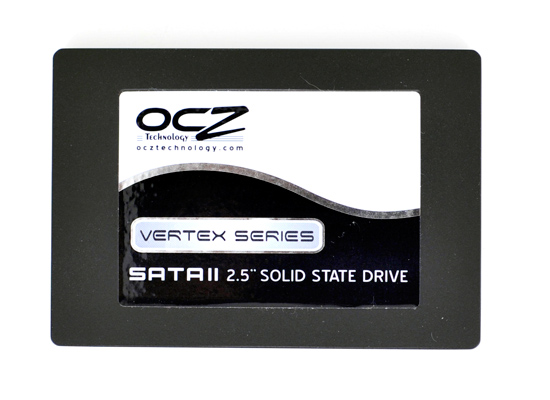
This is the OCZ Agility. You get the same controller as the Vertex, but with either Intel 50nm or Toshiba 40nm flash:
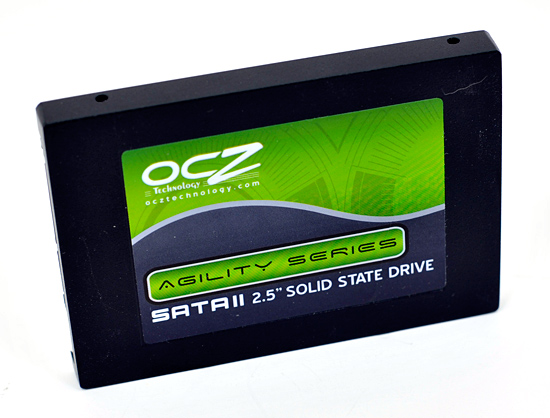
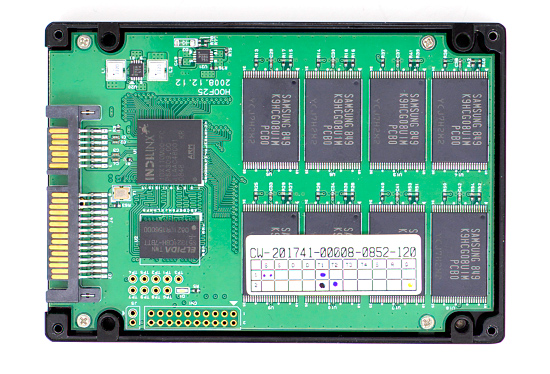
My Vertex used Samsung flash, like all other Indilinx drives
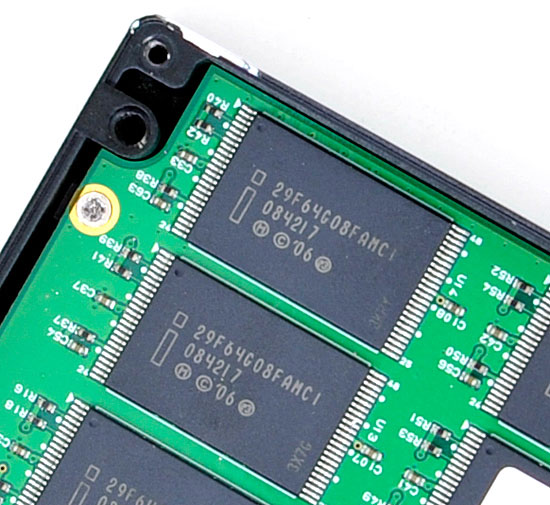
My Agility used Intel's 50nm flash
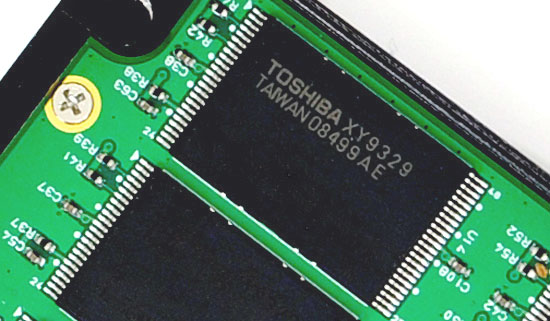
Some lucky Agility owners get Toshiba 40nm flash, which is faster.
The performance is a lower since the flash chips themselves are slower. I'm actually comparing the Vertex Turbo here but my Turbo sample actually runs as fast as most stock Indilinx MLC drives so it provides good reference for an Agility vs. a good Vertex drive:
| Used Performance | OCZ Agility | OCZ Vertex | Vertex Advantage |
| 4KB Random Write | 7.1 MB/s | 7.6 MB/s | 7% |
| 4KB Random Read | 35.9 MB/s | 37.4 MB/s | 4.2% |
| 2MB Sequential Write | 136.3 MB/s | 155.8 MB/s | 14.3% |
| 2MB Sequential Read | 241.3 MB/s | 254.2 MB/s | 5.3% |
| PCMark Vantage Overall | 14468 | 14694 | 1.6% |
| PCMark Vantage HDD | 24293 | 25309 | 4.2% |
The performance ranges from 0 - 5% in the PCMark suite and jumps up to 4 - 14% in the low level tests. The price difference amounts to around 12% for a 128GB drive and 9.5% for a 64GB drive. There's no 256GB Agility.
| OCZ Agility | OCZ Vertex | Price Difference | |
| 64GB | $199.00 | $219.00 | $19 |
| 128GB | $329.00 | $369.00 | $40 |
| 256GB | N/A | $725.00 | N/A |
If you want to make the jump to an SSD and are looking to save every last dollar, the Agility is an option.
I think the Agility line is a great idea from OCZ. I’m not sure about you but personally, as long as the flash is reliable, I don’t care who makes it. And I’m willing to give up a little in the way of performance in order to hit more competitive price points.










295 Comments
View All Comments
albor - Friday, June 18, 2010 - link
Hi,try RamDisk Plus 11 from SuperSpeed.
(http://www.superspeed.com/desktop/ramdisk.php)
I use it on Xp pro 32 bit with 30 GB OCZ Vertex and 8 GB RAM. All above 3.2 GB is configured for swap and temp. Works perfectly and no visible SSD performance degradation after about 10 months.
Greetings.
jmr3000 - Thursday, August 23, 2012 - link
would explain to me how did you install it?the ssd as a second drive or did u install all the program on the ssd and use the hhd as a second?
thanks in advance!
jm
marraco - Friday, August 13, 2010 - link
SWAP file is one of the most important speed bottleneck on windows.it writes frequently to disk, so consumes the read write cicles of the disk, reducing his useful life.
But you are not buying space storage when you buy SSD. You are buying speed, so it makes nosense to buy an expensive SSD, and then remove from it all the activities that need the speed and are bottlenecks.
you buy a SSD to do the fastest SWAP. keep it on SSD.
Also, drive indexing permanently does a lot of reads, but it does not matter if the disk is fast. Drive indexing is like a little local google. If you disable it, and then search for all the files with a given text on it, searching the entire disk takes longer than just read an indexing.
Those activities consume the useful life of the disk, but at the time the disk gonna need replacement, (5 years, maybe), this disk gonna need replacement anyways, and new SSD gonna be dirty cheap, so it makes no sense to disable swap, temp files, and indexing.
On other side, prefetch, superfetch and defrag most probably are better disabled under SSD.
jimlocke - Wednesday, June 1, 2011 - link
Pehu, I know this much after your posting, but I was curios what you ended up doing for swap.8GB of RAM almost seems like swap may not be needed, unless you have several memory-hogging apps open.
Hope you still like your SSD. I'm looking at getting one soon, and agree this was an excellent article!
-Jim
krumme - Friday, October 9, 2009 - link
First: I submit to the importance of random 4k for ssd.Second: Over the years I have highly valued the articles of Anand. It is remarkable to see such detailed and enthusiastic information.
Now I have a few questions, following the general impact of this work.
Some observations first:
Following an article at Toms of a ssd article the 6 of September. The author was called a “Moron”, primarily as the random 4k synthetic bm was missing. The author was giving a different opinion on the indilinx vs intel, in the desktop sector, compared to Anand, giving more weight to transfer vs iops.
In an discussion about a Kingston V-series review, one said that he would take the indilinx ssd any day because it was “750 times faster” – an argument based on iops.
Another remark I have read several times is: “The Intel x25-M g2 is the only drive to get”.
Another is: “I would like to buy the Dell xx, but it has an Samsung controller so its of no use”.
I think it is time to stop, and make sure there is reason in what is happening for normal desktop use.
Do we have blind test where to tell the difference between the Intel, Samsung and Indilinx?
What is the actual real world bm fx. Win7 boot times for the 3 controlers?
There is something called good enough. When is 4k random read/write time enough, to not notice any subjective improvement afterwards in win7? Could it be fx. 10M/s?
The ssd is the best thing happening since 3d gfx, but I think we should enjoy what is happeing right now, because this time, could be the turning point where we soon are focusing on small differences.
Anyone knows what´s the next big thing?
bebby - Friday, October 30, 2009 - link
Random 4k and its relevance for desktop use is really the main topic for me, too.If I assume that I only use the SSD for the OS and software and save my data on other, much less expensive HDDs, I doubt very much that this discussion is worth it. The Samsung SSD then suddenly looks not so bad at all and much cheaper...
The next big thing for me would be an OS starting up in 5 seconds, like the OS we had in the 90s...making SSD obsolete.
bebby - Friday, October 30, 2009 - link
Random 4k and its relevance for desktop use is really the main topic for me, too.If I assume that I only use the SSD for the OS and software and save my data on other, much less expensive HDDs, I doubt very much that this discussion is worth it. The Samsung SSD then suddenly looks not so bad at all and much cheaper...
The next big thing for me would be an OS starting up in 5 seconds, like the OS we had in the 90s...making SSD obsolete.
marraco - Friday, August 13, 2010 - link
I agree completely. I think that human beings can nottice the difference between a hard disk, and a non bad SSD, because the difference is too large, but over "good enough", it does not matter much if the SSD is 2X or 4X faster in 4Kb random R/W.But mine is just an opinion, and I don't have good data to test it. I would like to read an article with repeatable testing on human perception.
SimesP - Wednesday, September 23, 2009 - link
I haven't read all 254 comments (yet) but I'd like to add my thanks to everyone elses for the comprehensive and illuminating article. This, along with the previous AnandTech SSD articles have increased my understanding of SSD's immensely.Thanks again!
ClemSnide - Friday, October 2, 2009 - link
Anand,A couple of guys from HotHardware.com pointed me at your SSD article, and it allowed me to make an informed decision. Thanks!
I wanted to speed up one game in particular (World of Warcraft) as well as routine OS tasks and web browsing. I think an SSD will do a bang-up job on at least the first two. The one I decided upon was the OCZ Agility 60 GB, which offers some growth room; I currently have 40 GB on my system drive. I know the Intel has better numbers, but I was able to get the OCZ for $156 after a rebate, which translates to decent performance at a price I can justify. (For the curious, it's available from TigerDirect for $184, and OCZ is giving a $30 rebate.)
Even though my system build is still months away, this should be usable on my old clunker as well. Very nifty!